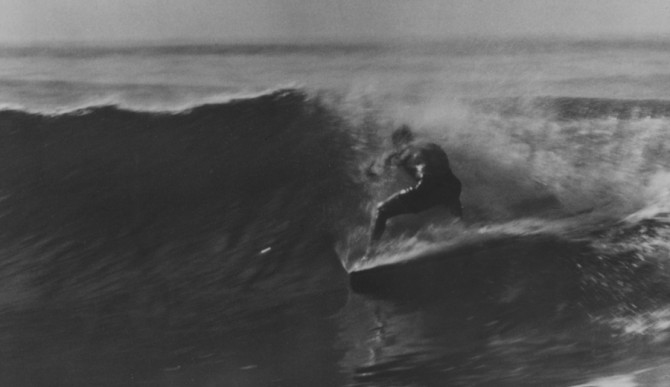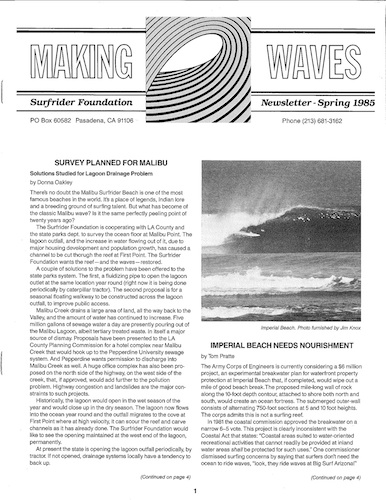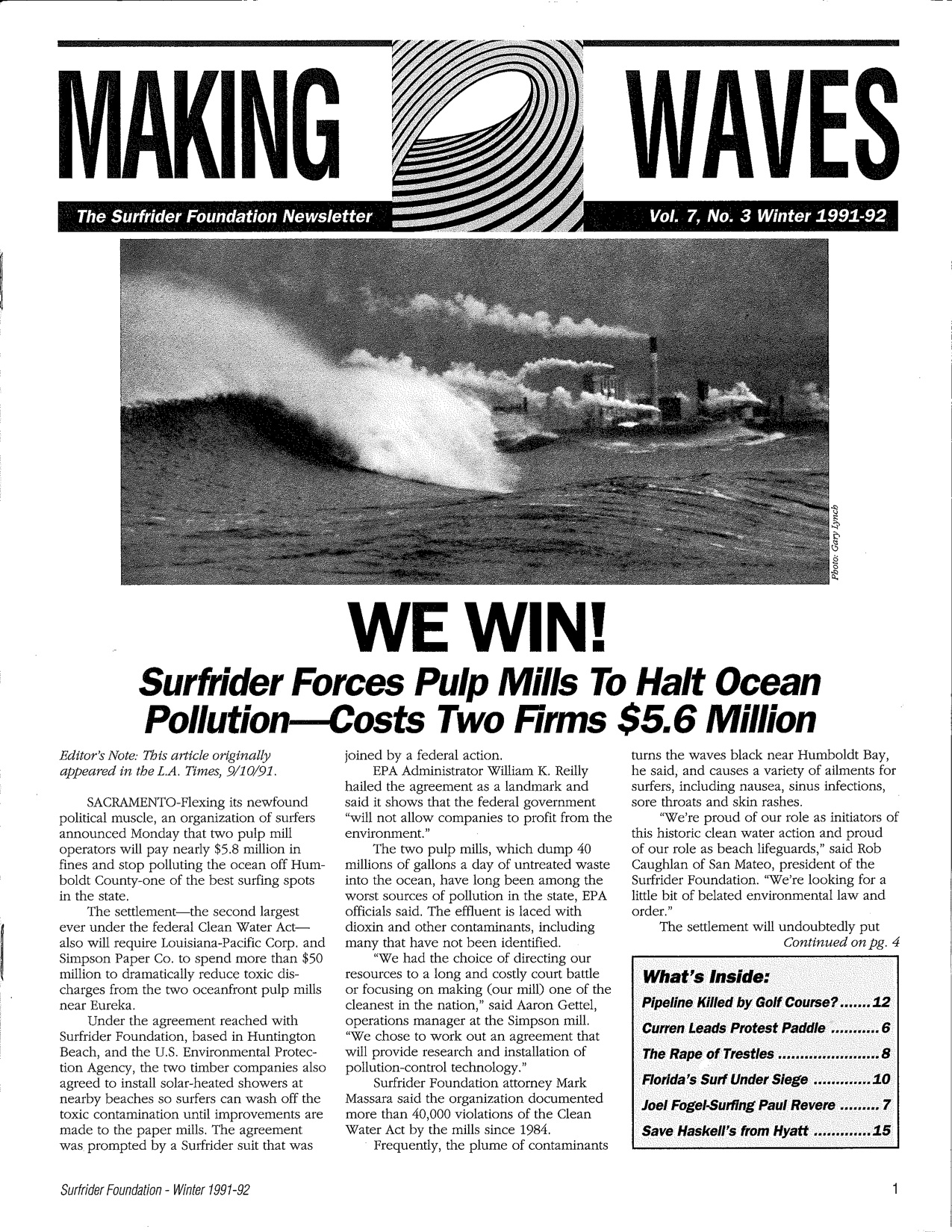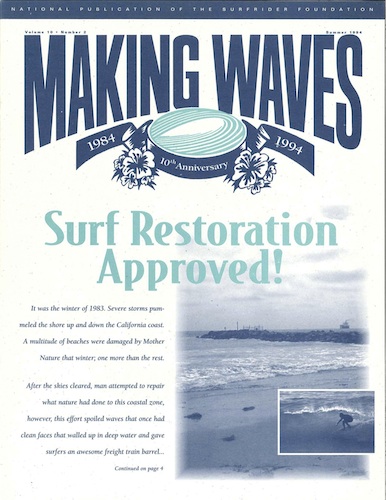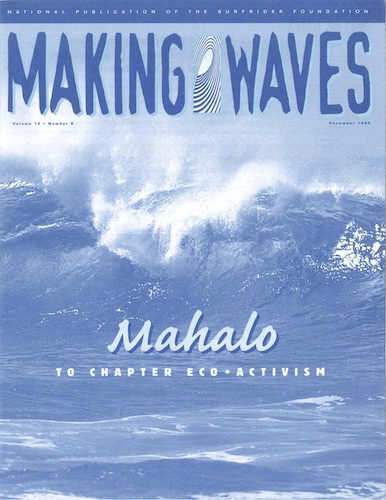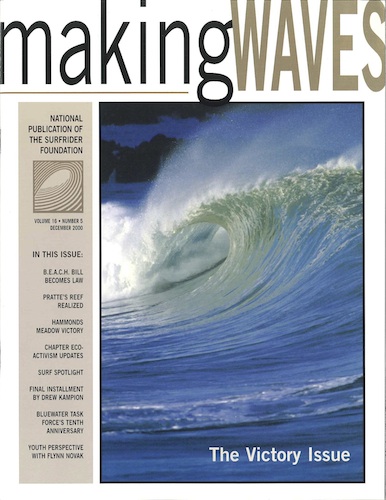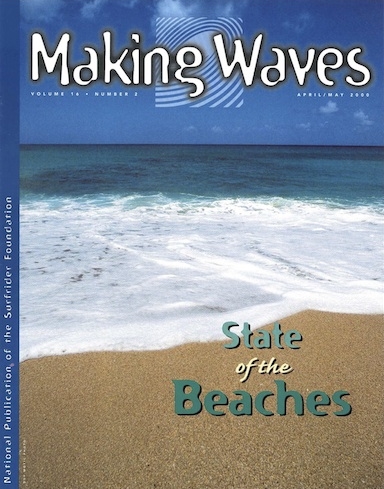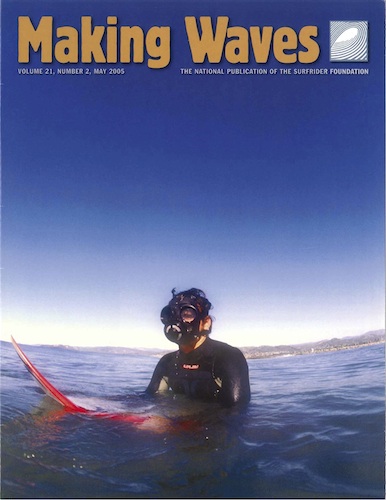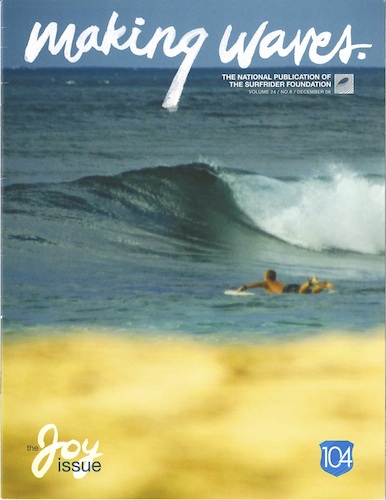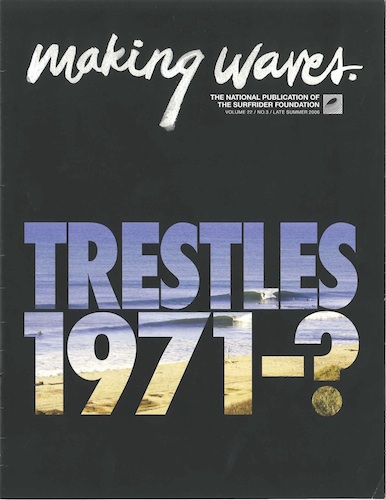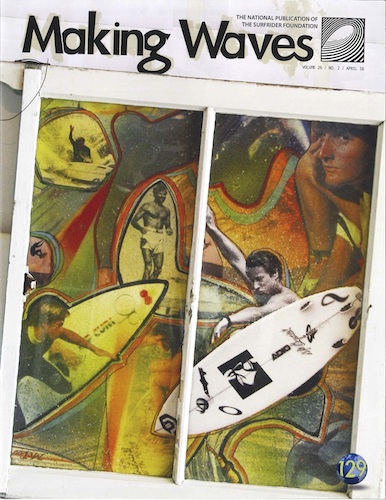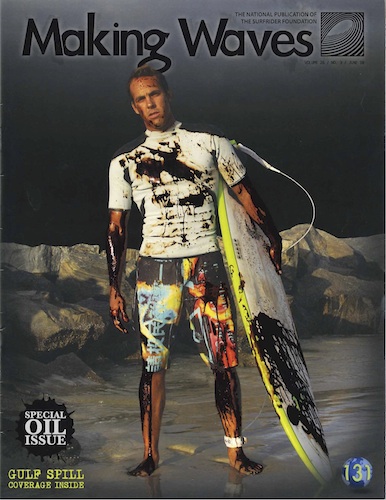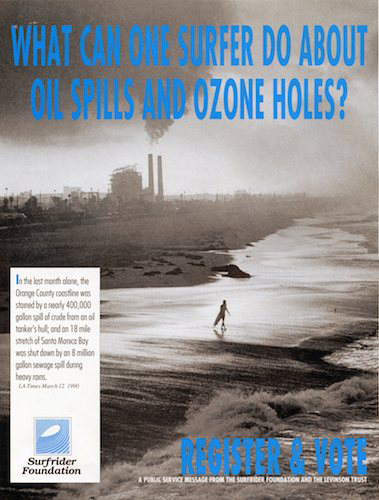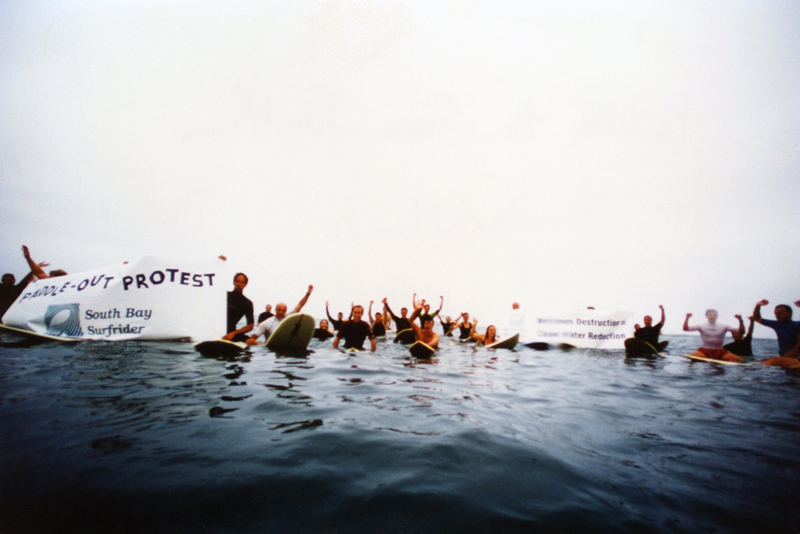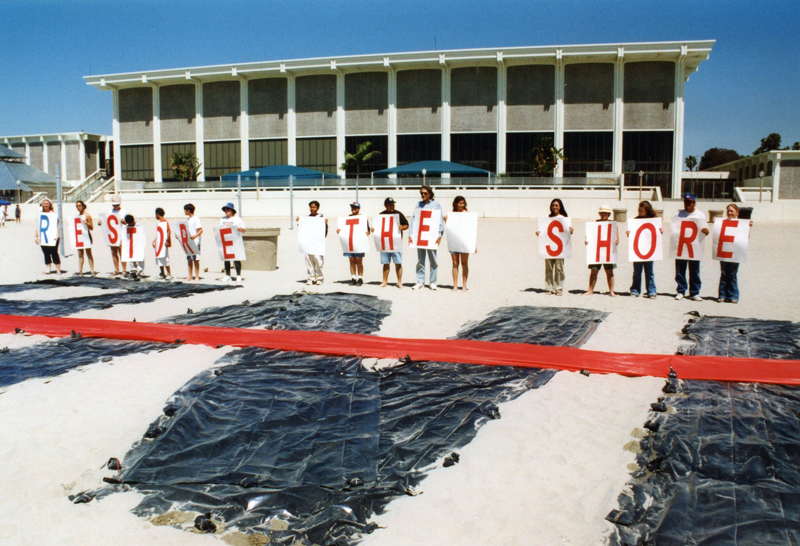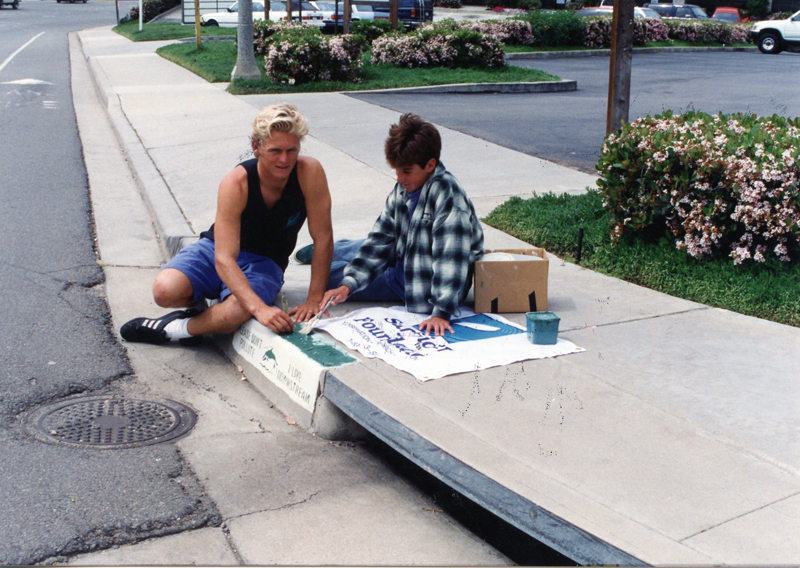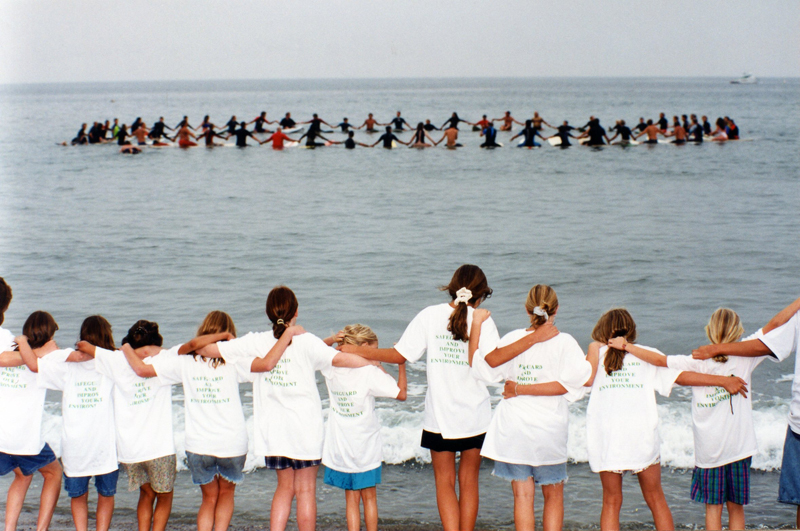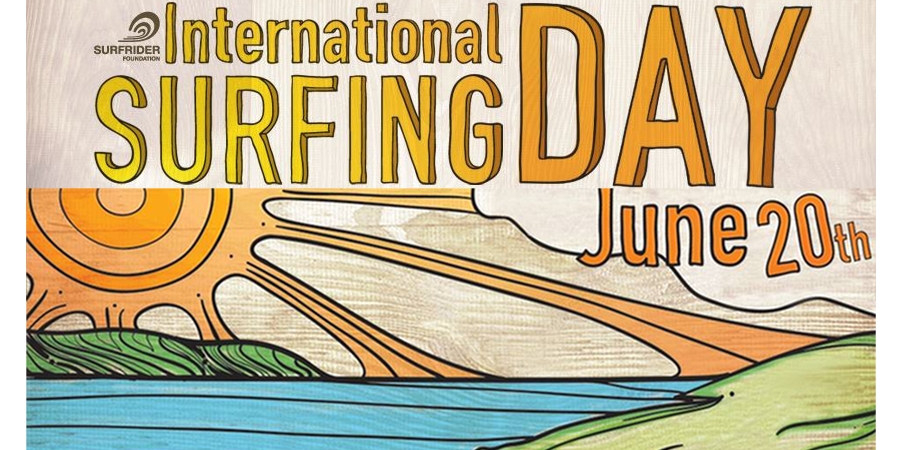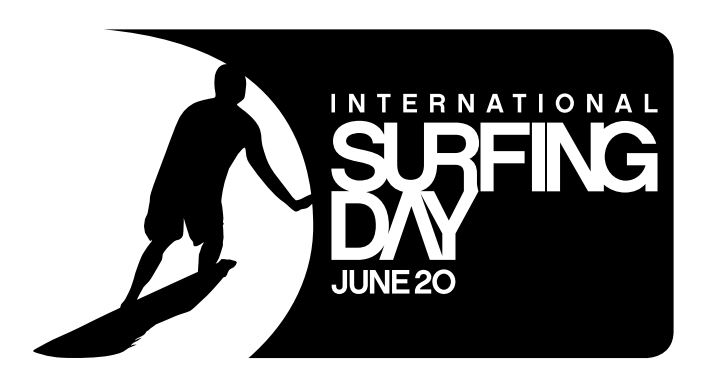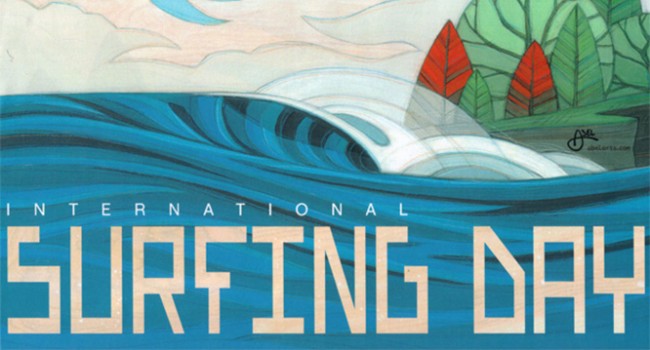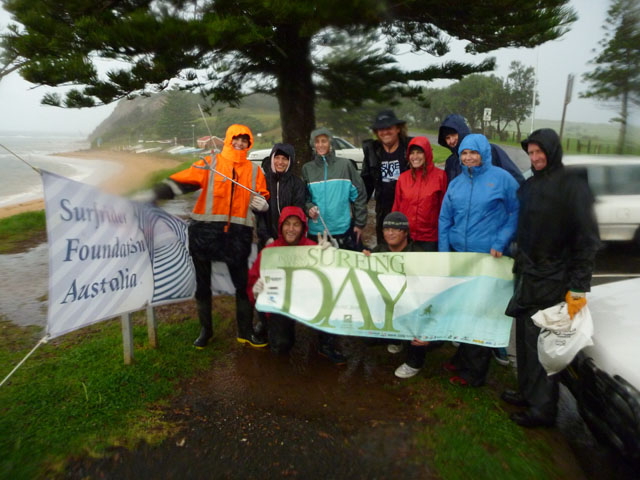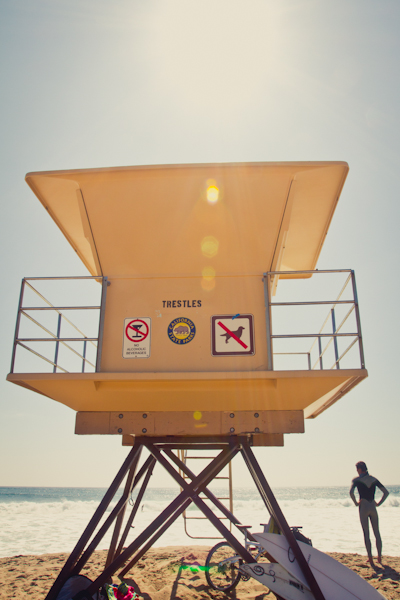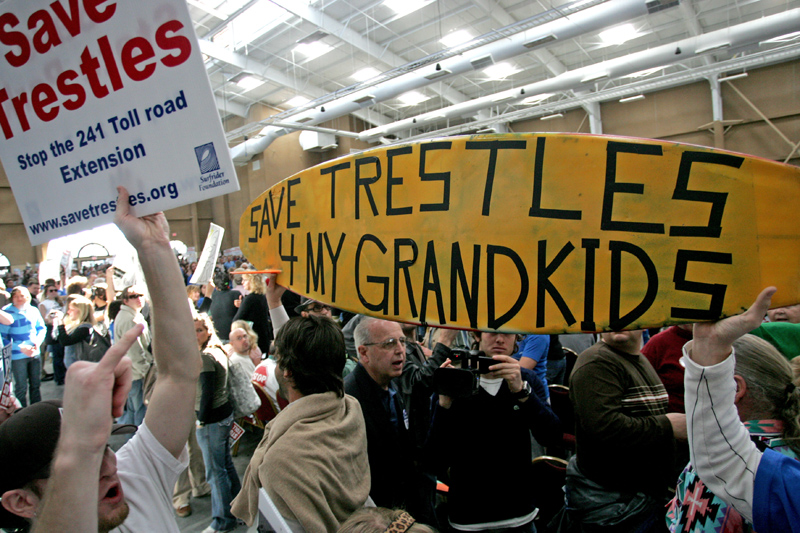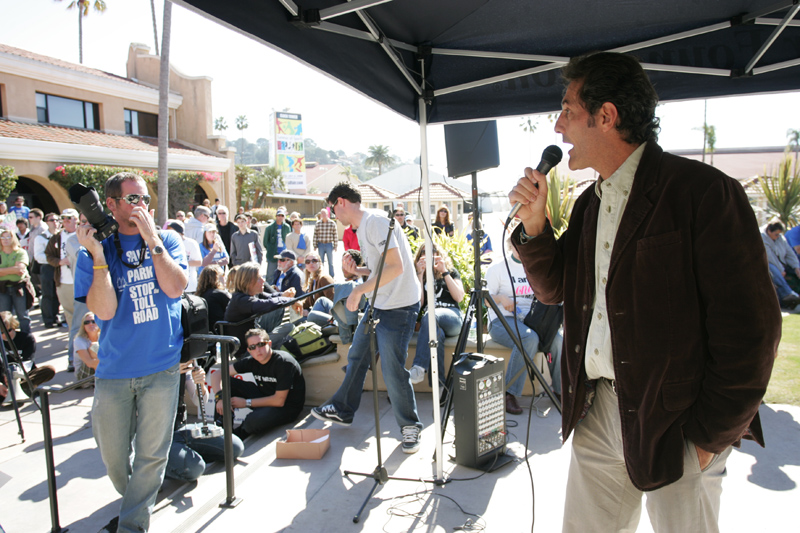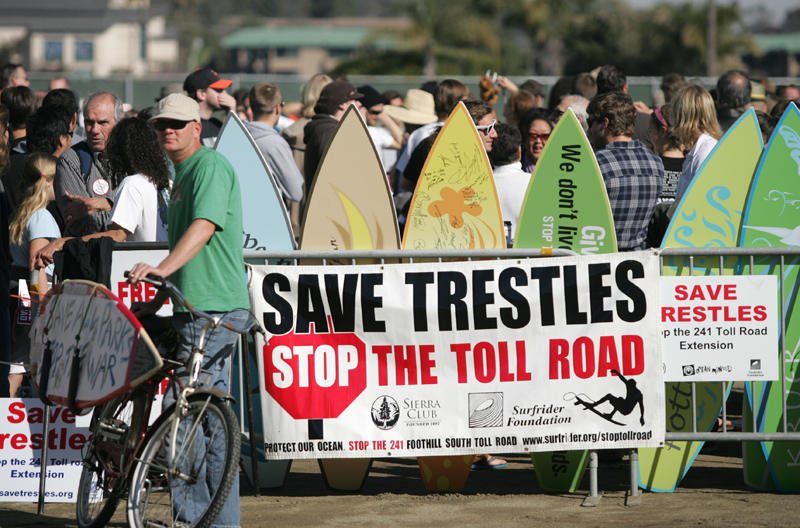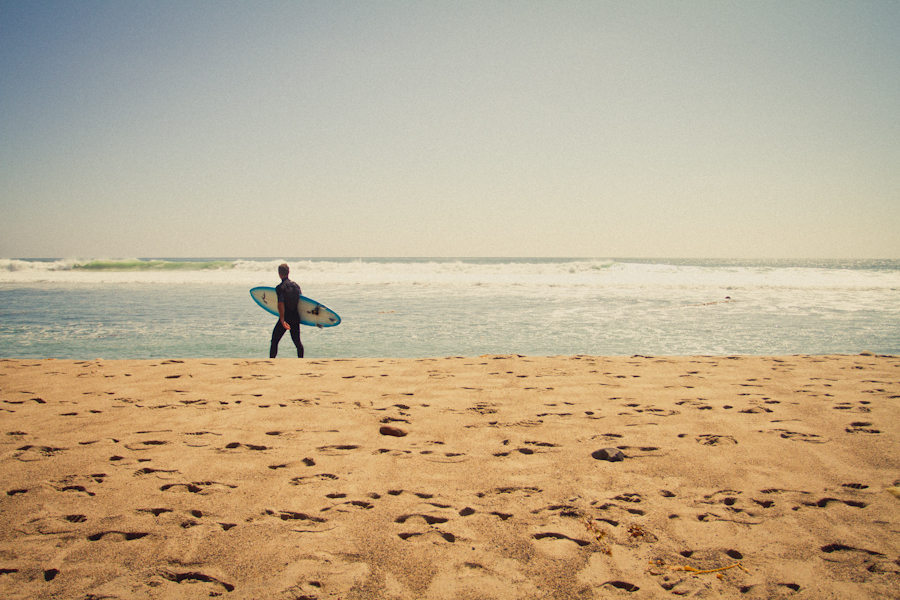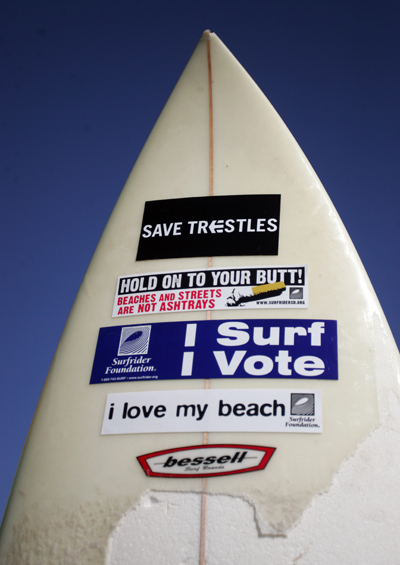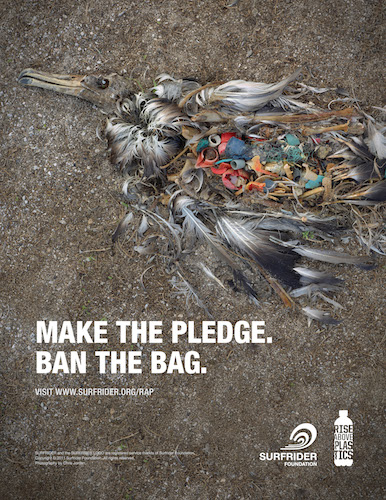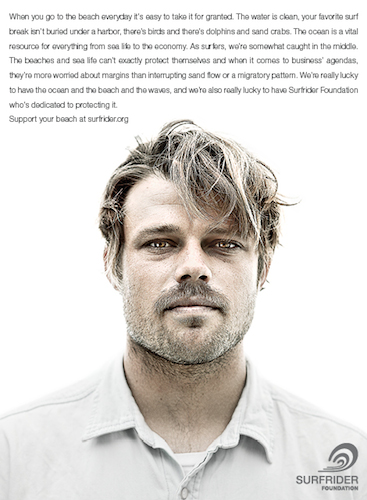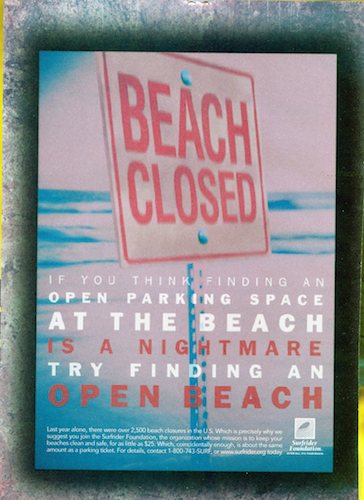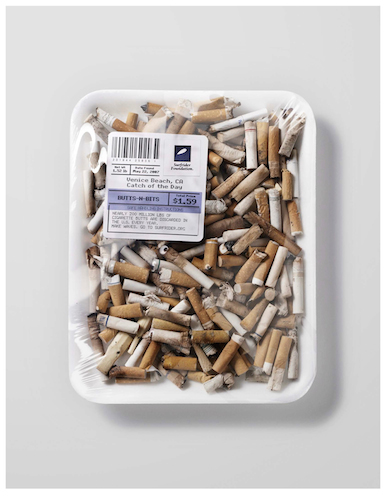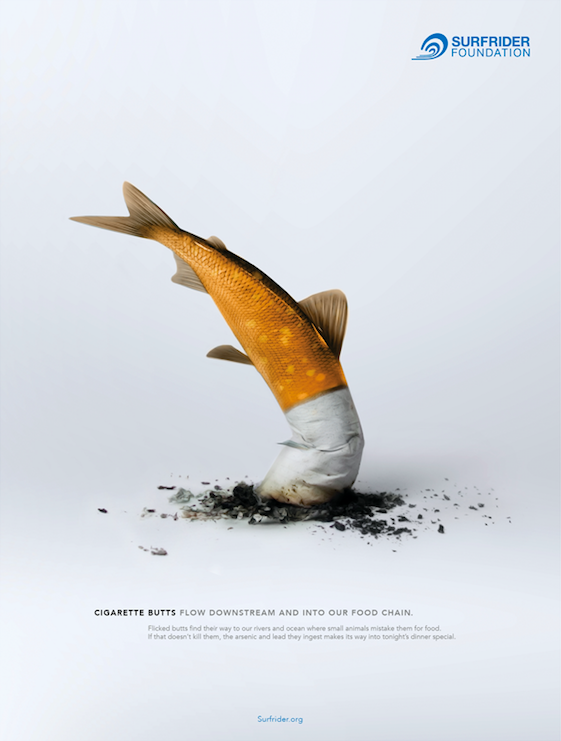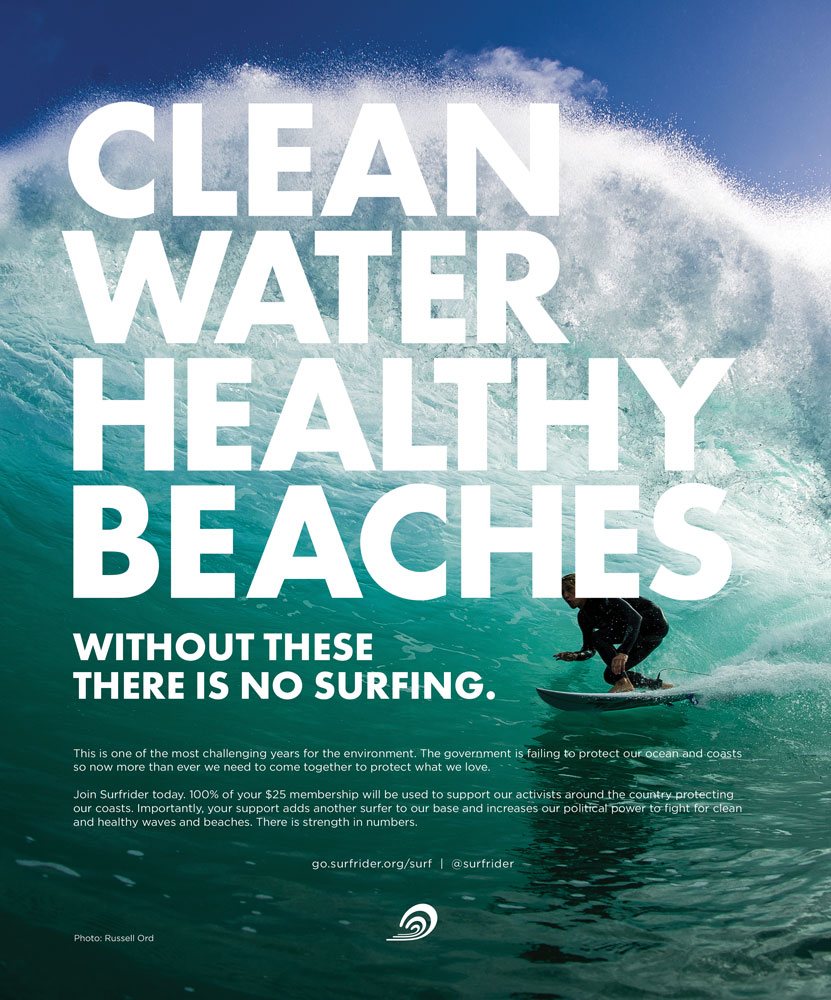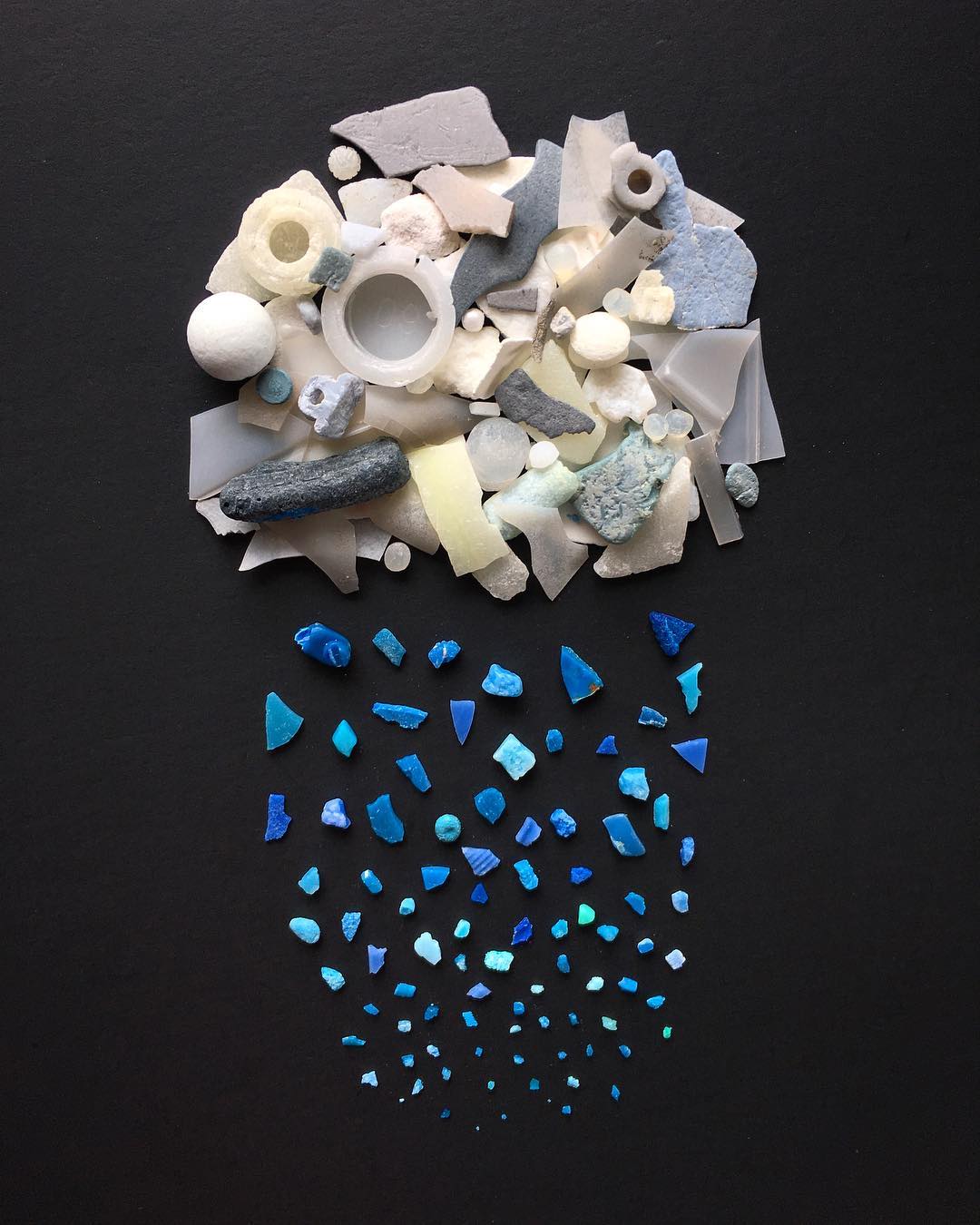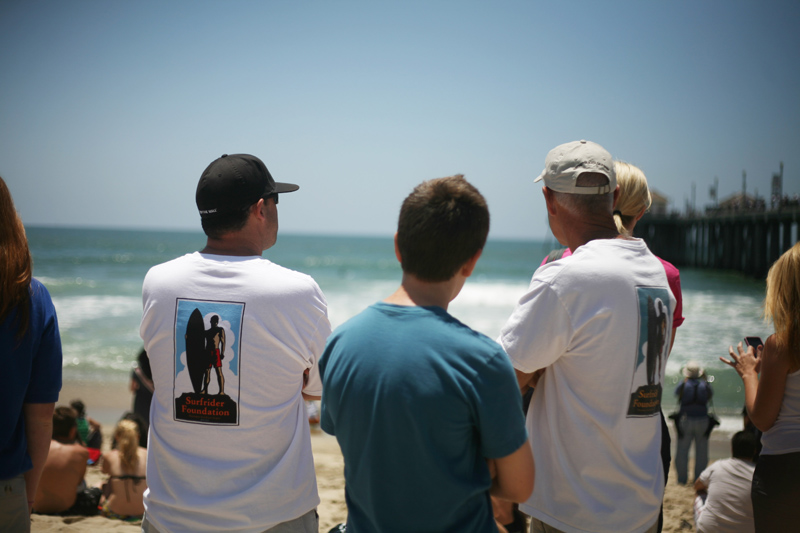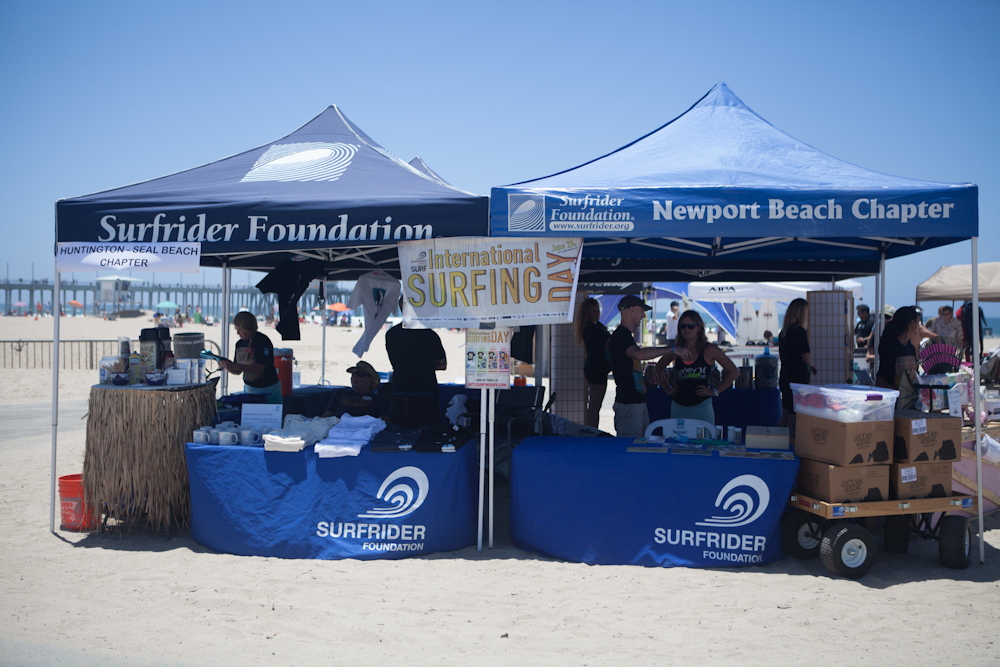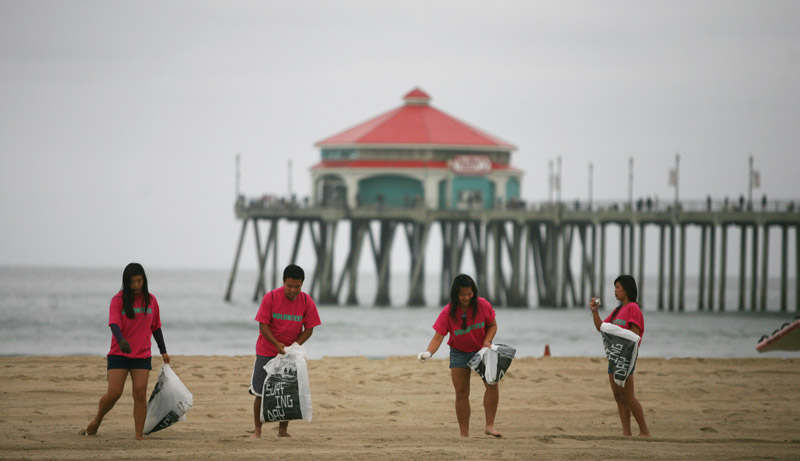





38 Years of Coastal Protection
Scroll down to learn more about the history of the Surfrider Foundation, a grassroots nonprofit environmental organization dedicated to the protection and enjoyment of the world’s ocean, waves and beaches, for all people.
38 Years of Coastal Protection
Scroll down to learn more about the history of the Surfrider Foundation, a grassroots nonprofit environmental organization dedicated to the protection and enjoyment of the world’s ocean, waves and beaches, for all people.
Constant Pressure, Endlessly Applied
Thirty eight years ago a group of surfers from Malibu, California, were concerned about the health risks associated with environmental threats posed by escalating coastal development at their favorite surf spot. They took action. Not even they could have envisioned the history they were making when they succeeded in protecting their beloved surf spot.
Since its inception in 1984, the Surfrider Foundation has evolved into one of the largest non-profit grassroots organizations with a volunteer-activist network dedicated to its mission to protect and enjoy the world's oceans, waves and beaches.
Today, the Surfrider Foundation is measurably stronger, with more force and movement than ever before. It has 80 chapters, including 96 student clubs, and more than 1 million supporters, volunteers and activists fighting over 100 active campaigns around the country. Armed with a model to defend the coast, the organization has a record of 600 victories since 2006.
Filled with times of uncertainty, it hasn’t been easy. The Surfrider Foundation’s long-term success and growth is a tribute to its founders vision, that taking on an environmental battle may not be easy, but with constant pressure, endlessly applied, it can be won. And the key to this is what makes the organization unique...
the people.
Highlights during the last 38 years.

1984: The Surfrider Foundation is Born
1984: The Surfrider Foundation is Born
The Surfrider Foundation was founded by Glenn Hening, Lance Carson, Tom Pratte, Chris Blakely and a group of surfers who were concerned about the environmental threats posed by escalating coastal development at their favorite surf break, Surfrider Beach in Malibu, California. Relentless, the group addressed the issues and presented solutions to California State Park officials at a public hearing in 1984. They won. And, little by little, they started chalking up successes and fighting battles that continue today.
August 22, 1984
The Articles of Incorporation were filed with the State of California, signed by Glenn Hening as President.
Why the name "Surfrider"?
Although it seems its obvious, Glenn Hening actually coined it “Surfrider” after the Surfrider Inn in Santa Monica, California. It was the hotel Hening stayed at when he was eight-years-old and first visited the west coast with his family.

1985-1995: Evolution of the Chapter Network
1985-1995: Evolution of the Chapter Network
1985
The Surfrider Foundation convinced the Santa Barbara County Board of Supervisors to lift a no-surfing ordinance at the Santa Maria Rivermouth in Santa Barbara County, California.
+
A federal court ruled in favor of the Surfrider Foundation when the U.S. Army Corps lost its battle over a proposed breakwater a Imperial Beach, San Diego, California.
+
Making Waves, the Surfrider Foundation's print newsletter, was created to provide members with organizational news, events, current coastal issues and scientific reports through contributions from staff, activists and volunteers. It was first published in the spring of 1985.
1987
The organization gained public beach access to South Cardiff State Beach (aka Seaside Reef) in San Diego, California, when the California State Parks Department installed the first ever electronic gate that automatically opened at dawn.
1989
The Surfrider Foundation, in a landmark decision, stopped the development of a marina (an ocean entrance and a mile-long breakwater) at Bolsa Chica State Beach in Huntington Beach, California.
1990
The Blue Water Task Force (BWTF), a volunteer-run, water testing, educational and advocacy program, was launched. Surfrider Chapters use the BWTF to provide valuable public health information to beach goers, creating public awareness and the political will to find and fix sources of beach pollution along the nation's coasts. It's the organization's most successful program to date.
1991
In the early 90's the Surfrider Foundation worked hard to support the implementation of new environmental laws, including the reauthorization of the Clean Water Act (which was enacted in 1972), to help prevent or curb the growing devastation of the nation's rivers, lakes, and coastal waters.
+
The Surfrider Foundation won the second largest Clean Water Act lawsuit in the United States history against two pulp mills in Humboldt County, California. As a result of this suit, one of these mills, the Louisiana Pacific mill, became the only pulp mill in North America to begin producing totally chlorine-free paper.
1992
As the U.S. coasts continued to be threatened by dirty water, irresponsible coastal development, the loss of beach access and destruction of its ecosystems, the need for coastal preservation grew. The Surfrider Foundation's global headquarters staff in San Clemente, California, received more requests for help than they were able to process. Thus the Surfrider chapter network was established, with the first chapters chartered in Orange County and San Diego County, California.
+
The Surfrider Foundation started to expand worldwide with affiliates in Europe (1990), Australia (1990), Japan (1993) and Brazil (1993).
1993
The San Diego Surfrider Chapter in San Diego, California, succeeded in getting a fine of $830,000 levied against the City of San Diego for violations in sewage outflows at Penasquitos Lagoon.
+
The California Coastal Commission made a landmark decision in Surfrider Foundation's and surfing's favor regarding the restoration of surfing spots lost due to the building of a coastal structure by Chevron Oil Company in El Segundo, California.
1994
The New Jersey Surfrider Chapter fought and won beach access for surfers at the Jersey Shore along the borough of Deal, just north of Asbury Park. This lawsuit sent a signal to other New Jersey towns not to be restrictive of surfer's rights to access.
1995
The Surfrider Foundation's website launched, and several Surfrider Chapters started websites.
+
The Surfrider Foundation and the Long Beach/North Orange County Surfrider Chapter saved 930 acres of coastal wetlands at Bolsa Chica in Huntington Beach, California.
+
The Surfrider Foundation settled a lawsuit with the City of Honolulu, Hawaii:. The city was penalized for over 13,000 Clean Water Act violations at Kailua Bay, Hawaii.
+
Despite some significant campaign wins, the Surfrider Foundation was struggling to make ends meet. Pearl Jam, an American rock band, donated $50,000 to the Foundation from two of their San Diego shows. The donation not only allowed Surfrider to remain open, it enabled the Foundation to expand its chapter network, catapulting it even further into an activist-driven grassroots organization.
Total # of Surfrider Chapters: 28

1996-2005: Impact and Awareness
1996-2005: Impact and Awareness
1996
MOM: Music for Our Mother Ocean Series. The Surfrider Foundation partnered with Surfdog Records to create a benefit album Music for our Mother Ocean (MOM); for which Pearl Jam, The Beastie Boys, Jewel, No Doubt, Sublime and the Ramones, among many others, contributed original songs. Its follow-up, MOM 2 (1997), included songs from The Offspring, Brian Setzer Orchestra, Jewel, 311, the Mighty Mighty Bosstones and Porno For Pyros. In 1999 MOM 3 debuted with songs by Snoop Dogg, Beck, Red Hot Chili Peppers, Chris Issak and Jane's Addiction. Pearl Jam graciously supported the launch of the (MOM) series recording the song “Gremmie Out of Control” for the compilation, and contributed “Whale Song” for the 1999 MOM 3 CD. In the end all three CDs raised more than $100,000 for the Foundation.
+
Numerous Chapter Victories! The Laguna Beach Surfrider Chapter (now the South Orange County Surfrider Chapter) convinced the city to implement a 10-point pollution plan. The Santa Cruz Surfrider Chapter succeeded in working with the City to address pollution runoff problems and also helped get education programs into schools. The San Francisco Surfrider Chapter received the Rossi Award for their beach clean up program.
1997
The Washington State Surfrider Chapter stopped a petroleum test burn along 10 miles of Washington coastline involving 2,500 gallons of crude oil.
+
The Palm Beach County Surfrider Chapter planted over 60,000 mangrove trees in two county wetland restoration areas.
1998
The Surfrider Foundation settled a lawsuit against the International Boundary and Water Commission (IBWC) for cleaner waters at the U.S./Mexico boarder area. The settlement required IBWC to research the feasibility of using environmentally sensitive ponding systems rather than chemical wastewater treatment for the border area.
2000
President Bill Clinton signed into law the Beaches Environmental Assessment, Cleanup and Health Act (B.E.A.C.H. Bill). The B.E.A.C.H. Bill establishes consistent nationwide standards for beach water quality monitoring, testing and notification. For several years, the Surfrider Foundation worked with a coalition of groups, including Natural Resources Defense Council, Center for Marine Conservation, and American Oceans Campaign on making the B.E.A.C.H. Bill a reality.
+
The State of the Beach Report, a comprehensive state by state review of America's shoreline measuring five critical beach health indicators, is published. The printed report ran from 2000-2008 and currently lives on the Surfrider Foundation's Beachapedia website.
2002
After 10 years of pressure from the Surfrider Foundation and the Huntington/Seal Beach Surfrider Chapter in Orange County, California, a huge battle was won when the Orange County Sanitation District Board discontinued operating under a sewage waiver that allowed them to discharge 240 million gallons of partially treated sewage, per day, off Huntington Beach for nearly 20 years.
+
The Surfrider Foundation helped stop a major hotel development project in Rincon, Puerto Rico. This would be one of many wins by the Foundation to protect this special coastal place.
2003
Thanks to pressure from the Surfrider Foundation and the public, the ban on surfing at New Jersey's legendary Asbury Park Beach was repealed.
2004
To protect Puerto Rico's rich marine biodiversity, some of the healthiest elkhorn corals in the world and the the surf that breaks over them, the Reserva Marina Tres Palmas (RMTP) was established in Rincon, Puerto Rico. It was a huge community effort, lead by The Surfrider Foundation. Reserva Marina Tres Palmas became one of the world’s first marine protected areas that included surfing as a key component.
2005
The Surfrider Foundation and Surfing Magazine teamed up and declared June 20 International Surfing Day. Starting with nearly 16 domestic and one international event, International Surfing Day has grown exponentially to 200-plus events in more than 30 countries. Since its inception, approximately 80,000 tons of trash has been removed from our coastal environments.
+
The Surfrider Foundation created and implemented a regional support staff model leading to the strategic placement of staff in Florida, Northeast, Washington, Oregon, Hawaii and Mid-Atlantic regions. The organization increased staff support from 20 in 2005 to 44 today.
+
The Surfrider Foundation was awarded with the National Oceanographic and Atmospheric Administration’s (NOAA) Excellence Award for Coastal and Ocean Resource Management, in the category of Non-Governmental Organization of the Year.
+
A long standing surfing ban at New York's famed Rockaway Beach was overturned thanks to pressure from the Surfrider Foundation's New York City Chapter.
+
The Surfrider Foundation's Virginia Beach Chapter helped ensure state legislators voted down a bill that would have opened their coastline to gas and oil exploration.
+
Art for the Oceans art auction in New York raised $320,000 in unrestricted funds for the Surfrider Foundation. Nearly 700 people, including celebrities, New York socialites and a host of East Coast surfers attended the event.
Total # of Surfrider Chapters: 62

2006-Present: Living and Growing in a Digital Age
2006-Present: Living and Growing in a Digital Age
2006
For the first time, the Surfrider Foundation defined coastal victory and set a goal for the organization to achieve 150 victories in the next five years.
+
The Surfrider Foundation won a lawsuit regarding several blocked public beach access points in Ponte Vedra, Florida.
+
The establishment of a ship salvage facility in Yaquina Bay, Oregon, is halted by the Surfrider Foundation Newport Oregon Chapter.
2007
The Surfrider Foundation's Wavemaker Awards were created to recognize volunteers, supporters and partners who contribute in extraordinary ways toward Surfrider's mission. Approximately 75 awards have been given to date. Award categories include Environmental Activism, Distinguished Service, Chapter Leadership, Corporate Partnership and Coastal Impact.
2008
Trestles SAVED! The Surfrider Foundation won a huge victory when the California Coastal Commission ruled against a proposed SR-241 Toll Road extension that would have threatened San Onofre State Park and Trestles surf beaches in Southern California.
+
The Surfrider Foundation global headquarters staff moved into a newly constructed building in San Clemente, California. It was awarded a LEED Gold certification by the U.S. Green Building Council (USGBC).
+
Surfrider Foundation launched several new programs
Not the Answer: A program focusing on protecting the nation's coasts from the risky practice of offshore drilling through grassroots advocacy at the federal and state levels. Surfrider chapter efforts include participation in Hands Across the Sand, an annual event where citizens join hands at beaches around the world to say no to offshore drilling and yes to clean energy.
Ocean Friendly Gardens: An outreach program designed to reduce urban runoff and residential water consumption in communities.
Rise Above Plastics: An educational and outreach program designed to raise awareness of and reduce the amount of plastic pollution in coastal and marine environments.
Know Your H2O: A program designed to educate people on the link between freshwater management issues and its impact on the nations oceans, waves, and beaches.
Quad: A youth service program providing young people with an opportunity to start school clubs throughout the United States.
Beachapedia: A wiki-based coastal information resource drawing on expertise of Surfrider Foundation experts and activists.
2009
The organization unveiled a new logo.
2010
The Surfrider Foundation achieved more than 150 victories between 2006 and 2010.
2011
The Surfrider Foundation won a public beach access case in Maine when the Maine Supreme Judicial Court unanimously ruled in McGarvey v. Whittredge that private ownership rights in the intertidal lands do not allow oceanfront property owners to exclude the public from crossing the wet sand to reach the ocean for SCUBA diving access.
+
Making Waves went digital.
2012
Marine Debris Reauthorization Act was a Rise Above Plastics victory that addressed plastic ocean pollution on a national level.
2013
The Maui Surfrider Chapter joined other marine conservation and Native Hawaiian groups in successfully mobilizing state lawmakers to oppose a golf course and 40 luxury homes overlooking Honolua Bay, Hawaii.
The Rhode Island Surfrider Chapter helped save the popular surf break, Ruggles.
2014
Surfrider Foundation won a protracted legal battle against billionaire and venture capitalist Vinod Khosla to restore public access to Martin’s Beach in San Mateo, California. Represented by Cotchett, Pitre & McCarthy legal firm and attorney Mark Massara. Worked closely with San Mateo Surfrider Chapter and California Coastal Commission.
California State Legislature passed the first statewide ban on single-use plastic bags, making California the first state to outlaw single-use plastic bags. Surfrider activists worked toward a statewide ban for six years.
2015
PROTECTING THE BEACH IN WAIKIKI
Surfrider’s Oahu chapter celebrated a victory at the Hawaii Supreme Court that set precedent to protect the sanctity of coastal setback ordinances and prevent abuse of zoning variances. Specifically, the Kyo Ya Hotel and Resort was not allowed to infringe on the coastal setback ordinance established to protect the public beach at Waikiki
2016
Papahanaumokuakea Marine National Monument
Along with many scientists, Native Hawaiians and environmental groups, Surfrider urged Pres. Obama to expand the Papahānaumokuākea Marine National Monument. Pres. Obama announced the expansion at the beginning of the IUCN World Conservation Congress, which was held in Honolulu in early Sept. The expansion of the Papahānaumokuākea Marine Monument would increase the area of the sanctuary from approximately 139,800 square miles to possibly 639,300 square miles. Hawaii is now home to the largest marine protected area in the world!
+
SURFRiDER LAUNCHES OUR OCEAN FRIENDLY RESTAURANTS PROGRAM
Plastic pollution is suffocating our ocean and the many animals that call it home. Researchers estimate there are now over 5.25 trillion pieces of plastic in the ocean with the number continuing to grow every day. This pollution is impacting our marine ecosystems, wildlife such as seabirds, dolphins, fish, and turtles, and plastic fragments are even displacing plankton at the base of the food chain. So what’s the best way to combat this global epidemic facing our ocean? It’s simple: we need to stop the problem at its source! The Surfrider Foundation’s Ocean Friendly Restaurants program does just that. One restaurant, one customer at a time, increases awareness, drives change in behavior and ultimately creates scalable impact to reduce our plastic (and water!) footprint. Learn more about the program here
+
Protected the Atlantic from Offshore Oil Drilling
On December 20th, 2016, President Obama announced permanent ‘withdrawal’ of parts of the Atlantic and Arctic Ocean from future oil and gas drilling. The move protects critical ecological areas off the Atlantic coast along with most of the Chukchie and Beaufort Seas in the Arctic.
2017
Atlantic Protected from Seismic Blasting
On January 6th, 2017, the Bureau of Ocean Energy Management (BOEM) announced denial of all pending permit applications for seismic airgun blasting off the Mid- and South Atlantic coast. The decision is a huge victory for Surfrider Foundation's ongoing campaign to Protect the Atlantic coast from oil and gas development. While the Trump Administration is pushing for both seismic exploration and new offshore drilling again, BOEM's decison is great news for our marine ecosystem and Atlantic coastal communities.
+
Sand mining shut down in Monterey!
Years of efforts by Surfrider Foundation's Monterey chapter and partners to shut down the last coastal sand mine in the United States paid off on July 13th, 2017. The California Coastal Commission unanimously approved an agreement with multinational building-supply company CEMEX to shut down its 8-acre sand mine located in the small Monterey County town of Marina.
+
+
Helping the Community in Rincón Puerto Rico Find Clean Water after Hurricane Maria
In the days and weeks following Hurricane Maria, the Rincón Chapter’s Blue Water Task Force rallied to restart their water testing program in post-storm conditions to provide critical public health and water safety information for local communities.
When Hurricane Maria hit Puerto Rico last fall, it knocked out the entire electrical grid and much of the island’s infrastructure, including roads, hospitals, water supply and telecommunications networks. Amazingly enough, over eight months later, there are still nearly 12,000 homes and businesses without power!
Although chapter volunteers were experiencing the same difficult post-storm conditions as the rest of the island, they were able to restart their water quality monitoring program by teaming up with other relief and health organizations. Watch this video to hear from our Surfrider volunteers themselves how they were able restart their program and empower communities to generate their own water quality information and protect their health.
2018
Surfrider helps pass legislation that bans toxic chemicals oxybenzone & octinoxate in sunscreens to protect coral reefs and human health.
In June, the state legislature passed the nation’s first ever statewide ban on sunscreens that contain chemicals oxybenzone and octinoxate, which are known to harm coral reefs and local fish. On July 3, the governor of Hawai'i signed this bill into law, which will require that every Hawaiian island stops selling sunscreen that contains these two chemicals by January 1, 2021.
The Surfrider Hawai'i chapters have been advocating for this type of coral reef protection for years. In 2016, Surfrider's Hawaii Chapters launched a statewide campaign to ban the toxic chemical oxybenzone. The Surfrider Foundation’s five chapters in Hawaii and our extensive network of supporters are concerned about the damage chemicals like oxybenzone and octinoxate are doing to our reef system, which annually generates about $800 million in gross revenues to the state of Hawaii. We are part of the Hawaii Reef and Ocean Coalition, which was formed last year by concerned coral reef scientists, educators, government officials and environmental groups, and one of our top priorities is banning sunscreens with oxybenzone.
+
San Francisco Passes More than Just a Straw Ban
San Francisco passed the Plastic, Toxics and Litter Reduction Ordinance in August 2018 in response to the outcry against marine plastic pollution. After three years of groundwork by the Surfrider Foundation San Francisco Chapter and allies to raise awareness and build a movement to reduce the use of single-use plastic straws, San Francisco has adopted an ordinance that will ban the sale and distribution of single-use plastic and bio-plastic straws, utensils, stirrers and similar items, in addition to foodware containers that contain fluorinated chemicals.
The ordinance further requires that all single-use foodware and accessories must be compostable (accepted by the city’s composting program) or recyclable.
+
Surfrider launches a new logo on our 34th birthday!
+
Surfrider’s “The united states and oceans of america” campaign launches
We urged the American people to join us to start a new fight. The fight to free our ocean and coasts. Our nation is made up of more water than land. America’s oceans cover nearly 4.5 million square miles, which is 23% greater than U.S. landmass. The coast is a top tourist destination with more than 100 million people visiting our nation’s beaches annually. In fact, coastal recreation and tourism constitute 2.2 million jobs and contribute $115 billion to the nation’s economy every year. But clean water and healthy beaches are increasingly threatened by plastic and ocean pollution, offshore oil drilling, rollbacks to federal protections, development and rising tides. We each have a stake in taking action to ensure the places where we surf, swim, play and live are protected for this and future generations. Together, we are the United States and Oceans of America
2019
#DrillingIsKilling
For those of us who love the coast, the negative impacts of offshore oil drilling are obvious. Offshore drilling has a proven track record of polluting the ocean, damaging coastal economies and threatening a way of life enjoyed by millions of people. T
o help set the record straight, Surfrider released a new short film with surf legend Rob Machado and surfer/ comedian, Tyler Allen, on the Trump administration’s plans for new offshore drilling and what this means for our ocean and coastal communities.
+
Surfrider's network visits Washington D.C. to defend our nation's coasts!
Over one hundred Surfrider Foundation members and recreation industry partners traveled to Washington D.C. on February 28 – March 1st to meet with federal leaders about ways to protect our ocean, waves, and beaches.
+
A Real Border Emergency
The health and well-being of coastal communities on both sides of the U. S. - Mexico border and the millions of people who enjoy this stretch of coastline have long been under threat from the flow of untreated sewage, industrial pollution and trash into the Tijuana River Watershed and the Pacific Ocean.
Learn more about this problem and how Surfrider San Diego is empowering local communities to protect their health and advocate for solutions at the link below.
+
Florida’s Toxic Algae Crisis
in 2019, Florida experienced some of the most severe harmful algal blooms on record, with toxic red tides and blue-green algae suffocating the coastlines.Florida is well-known for its year-round warm climate and beautiful, sandy beaches. While beach tourism drives the state’s economy, people who visit and live in the Sunshine State are losing the long-standing recreational opportunities that they cherish. Ongoing water pollution and harmful algal blooms, including red tides and toxic blue-green algae, are putting public health at risk and causing massive die-offs of fish, marine life and sea turtles.
+
Hawaii Passes First Ever Ban on Reef Harming Sunscreens
In 2019 the state legislature passed the nation’s first ever statewide ban on sunscreens that contain chemicals oxybenzone and octinoxate, which are known to harm coral reefs and local fish. Today, the governor of Hawai'i signed this bill into law, which will require that every Hawaiian island stops selling sunscreen that contains these two chemicals by January 1, 2021.
2020
The Seas Are Rising and So Are We!
Over 150 Surfrider members, industry leaders and surf ambassadors traveled to Washington D.C. on February 26-28 to meet with federal leaders about ways to protect our ocean, waves, and beaches. Participants visited 145 Senate and House offices to urge immediate action on climate change, plastic pollution, water quality and other key issues affecting our coasts and ocean.
+
Surfrider Foundation believes that everybody deserves access to clean water to surf, swim, and play in
The Blue Water Task Force (BWTF) is Surfrider’s citizen science water testing program that provides critical water quality information to protect public health at the beach.
Annually, the Blue Water Task Force:
Runs 55 Active Water Testing Labs
Tests 480+ Beaches
Collects 7500+ Samples
We are happy to present this freshly released film to share the stories of our BWTF volunteers nationwide.
+
STAY HOME, SHRED LATER
COVID-19…
In March of 2020, the world ground to a halt as COVID-19 took over our daily lives. Surfrider developed tools, worked with leading scientists and gave the public valuable information to help navigate these difficult times.
+
U.S. Supreme Court Delivers Victory for the Clean Water Act!
Surfrider Foundation and our co-plaintiffs in the Hawaiʻi Wildlife Fund v. County of Maui case are celebrating an important victory today with the decision to protect water quality and the intent of the Clean Water Act by the United States Supreme Court. In a 6-3 ruling, the majority of the court refused to allow a large loophole in the Act and found that liability for pollution exists “when there is direct discharge from a point source into navigable waters or when there is the functional equivalent of a direct discharge.”
+
Congress Passes Historic Legislation to Protect Public Lands!
Surfrider and our conservation partners across America joyfully celebrated this victory because we have been working for years to fund the LWCF. The Great American Outdoors Act finally ‘makes the LWCF whole’ by fully funding the program, as originally intended by President Kennedy in 1965.
When President Kennedy signed the LWCF into law, his vision was based on a simple concept: take revenues from offshore oil and gas production to protect parks, open spaces, sensitive habitat and to improve recreational opportunities across the U.S. Surfrider is adamantly opposed to new offshore drilling, but we believe it makes sense to direct a percentage of royalties from leases issued in the past to help support conservation. Unfortunately, the program has never been fully funded over the past 55 years.
+
15 Years, Thousands of Activists, One Goal — Save Trestles Forever
After a marathon campaign of more than 15 years, the battle to Save Trestles came to fruition today when Governor Newsom signed AB 1426 into law. This new legislation will protect San Onofre State Beach and Trestles from any type of road construction.
The valiant effort to Save Trestles has been a long and winding road (no pun intended). The first step in this battle was the formation of our mighty Save San Onofre Coalition (SSOC), which represents millions of people from local and national organizations. In 2005, SSOC first came together when over 1,000 activists showed up at a Parks and Recreation Commission hearing to speak out against a six-lane toll road that would have cut through San Onofre State Beach — damaging the last remaining undeveloped watershed in southern California, the world-famous surf break at Trestles Beach, multiple endangered species, and sacred Indigenous sites.
2022
Surfrider Lawsuit Improves Ocean Water Quality and Protects Public Health
Since Surfrider’s first iconic win in 1984 to defend Malibu’s famed surfing break, the organization has worked to preserve the ocean, waves and beaches through a powerful network of volunteers. In recognition of more than three decades of coastal victories, the Surfrider Foundation has introduced a new logo that pays homage to the initial brand design and emphasizes the wave of impact that Surfrider is generating for the protection and enjoyment of the ocean and coasts.
Today Surfrider has over 82 Chapters, 86 high school and college clubs and more than 1 million supporters, volunteers and activists fighting over 100 active campaigns around the country.
Armed with a model to defend the coast, since the Surfrider Foundation started counting victories in 2006, it has won 500 victories (and counting).
Protect what you love today, tomorrow and for generations to come.
For additional information about the Surfrider Foundation please visit surfrider.org



